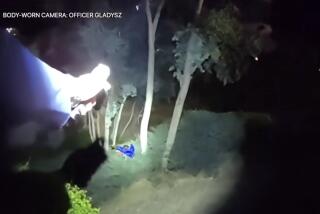Sam Knott; Father of Murder Victim
- Share via
SAN DIEGO — Sam Knott, a grieving father who became a crusader for victims’ rights and police officer accountability after his daughter was murdered in 1986 by an on-duty CHP officer, died of an apparent heart attack Thursday night while tending a memorial at the spot where his daughter’s body was found.
“The pain of Cara’s murder never left him,” said Dist. Atty. Paul Pfingst, who successfully prosecuted CHP officer Craig Peyer for the murder of 20-year-old Cara Knott. “His every act, every day, took him back to Cara. In 25 years in this business, I’ve never seen anyone like Sam Knott.”
Knott, 63, a San Diego native who had a history of heart problems, was at the location off Interstate 15 where his daughter’s strangled body had been dumped off a bridge by Peyer two days after Christmas 1986.
When Knott underwent surgery last year, he said his will to live was bolstered by a determination to be at Peyer’s first parole hearing, set for 2005.
“He never mentioned Peyer’s name,” Pfingst said. “He always said ‘The Monster.’ ”
The murder of Cara Knott, a student at San Diego State University, traumatized the San Diego community as few other acts of violence have. The horror deepened with the arrest of Peyer, once considered a model officer who before the killing did television spots for the CHP warning women about the dangers of strange men who tried to contact them on the freeway.
When the first trial ended in a hung jury, Dist. Atty. Edwin Miller replaced a veteran prosecutor with Pfingst, then a junior prosecutor in one of the suburban offices. The case propelled Pfingst into prominence and led to his election over Miller as district attorney in 1994.
Knott, a former stockbroker, campaigned tirelessly for local and state law enforcement agencies to install technology that would allow them to monitor the whereabouts of their officers at all times.
He also pressed law enforcement to ease the standard 48-hour waiting period before issuing a missing-person’s bulletin to officers in the field.
When his daughter failed to return from a visit with friends, Knott frantically asked police to issue such an early report but was rebuffed.
Since Cara Knott’s death, numerous agencies have installed the kind of monitoring system that Knott and others suggested and have shortened the missing-person reporting time.
In San Diego County, an $83-million communication system now links law enforcement agencies and emergency services agencies to provide the kind of cooperation and coordination that was impossible the night Cara Knott was killed.
Knott and his wife, Joyce, created a clearinghouse for the parents of missing children to inform them of their rights and what emergency services are available. Scholarships are awarded through the Cara Knott Foundation.
And in 1999 Knott and others, including police officers who investigated the crime, dedicated a park at the murder site to Cara Knott and other murder victims and planted a row of trees.
Knott often went to the park to help with maintenance. He was spotted about 5 p.m. by a passing San Diego police officer. Ninety minutes later, a second officer found him slumped over in his car.
Trial evidence indicated that Peyer, a 13-year veteran of the CHP, had singled out young, attractive women driving alone for traffic stops.
The CHP had ignored a harassment complaint from one of the women--a fact angrily pointed out by the trial judge in sentencing Peyer, the first CHP officer convicted of first-degree murder while on duty, to 25 years to life in prison. In 1996, the Knott family reached a $2.7-million settlement with the CHP.
“He was a cheerful, gregarious person,” Pfingst said, “but you would never mistake him for a happy person.”
A resident of El Cajon, Knott is survived by his wife and their adult children Cynthia, Cheryl and John. After Cara Knott’s murder, Knott devoted himself to issues of police conduct and victims’ rights.
“For the last 14 years of life, he was a full-time crusader for justice,’ said San Diego attorney Michael Crosby, who represented the Knott family in the CHP suit. “Sam really believed that Cara would continue to live on if he kept working for her and other victims.”
Slowed by a cancer operation and a hip replacement, Knott had vowed not to stop lobbying.
“People say, ‘The Monster got a life sentence,’ ” Knott once said. “They don’t realize it’s a life sentence for us, too.”
More to Read
Sign up for Essential California
The most important California stories and recommendations in your inbox every morning.
You may occasionally receive promotional content from the Los Angeles Times.













